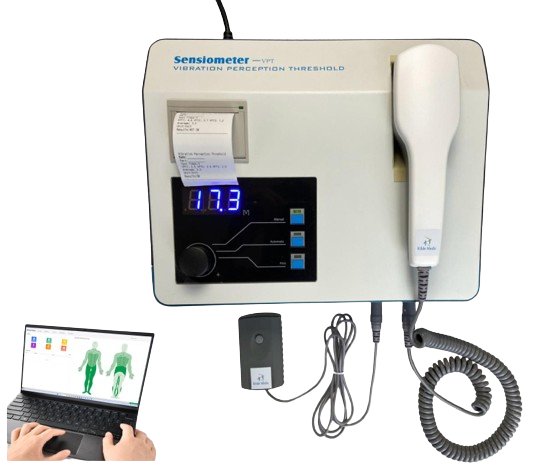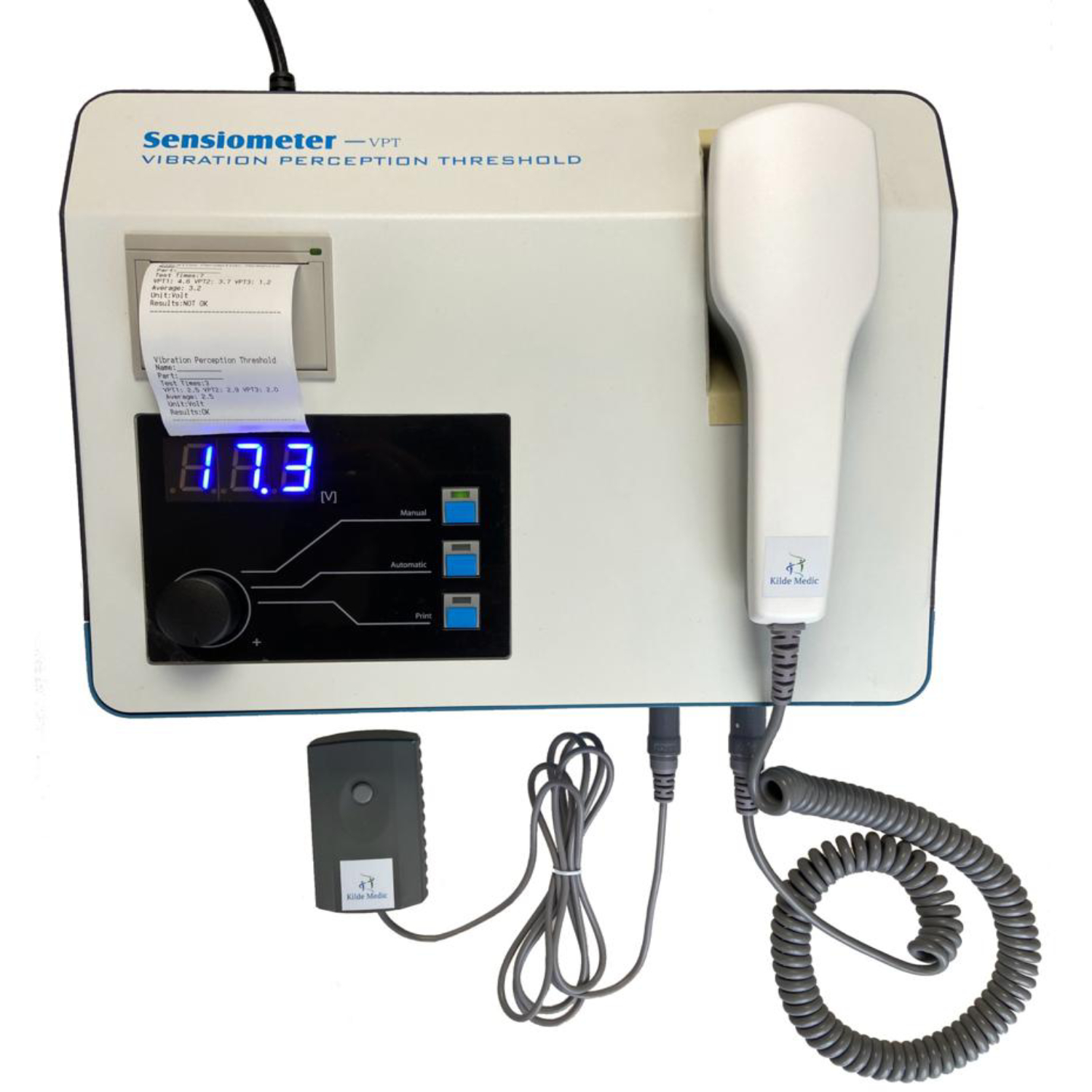Detect Polyneuropathy
Objective to develop clinically useful reference ranges for vibration perception threshold (PTs), using Kilde Medic Digital Biothesiometer / Sensiometer / Vibrometer. It’s can connect and store the result on pc, DICOM, HPPT protocol along with the software which comes with the device

Detect Polyneuropathy
Objective to develop clinically useful reference ranges for vibration perception threshold (PTs), using Kilde Medic Digital Biothesiometer / Sensiometer / Vibrometer. It’s can connect and store the result on pc, DICOM, HPPT protocol along with the software which comes with the device

Kilde Medic Digital Biothesiometer with PC Connection
The Kilde Medic Biothesiometer, also known as a Vibrometer or Sensiometer, is indeed an instrument used to measure the threshold of perception of vibration in humans. It’s commonly used in clinical settings, particularly in neurology and diabetic care, to assess sensory neuropathy.

Welcome to our website! Discover the versatile applications of the Kilde Medic Biothesiometer, a cutting-edge instrument utilized in clinical settings, particularly in neurology and diabetic care.
In diabetic patients, peripheral sensory neuropathy can lead to a decreased ability to perceive vibration, which can be accessed through the vibration perception threshold (VPT) measured by the Kilde Medic Digital Biothesiometer. Higher VPT values indicate reduced sensitivity to vibration, which correlates with neuropathy. This neuropathy can increase the risk of foot ulcerations and other complications.
Uses of Digital Biothesiometer, Sensiometer, Vibrometer
Assessment of Diabetic Neuropathy
An external tool called a digital biothesiometer measures the loss of vibration sensitivity in diabetic feet. It is also known as the siowin, vibrometer, vibrosense, or sensiometer VPT. It is used to verify ulcer risk and quantify diabetic polyneuropathy. The device has an electrically arranged fork that slowly increases the vibrations when the patient loses feeling.
Monitoring Peripheral Neuropathy:
A digital biothesiometer, sometimes called a vibrosense, sensiometer VPT, or siowin, is used to detect the loss of the ability to feel, analyze diabetic feet, and monitor external neuropathy. This very easy-to-use method can diagnose neurological conditions with lowered vibratory sensory limits for routine screening.
Assessment of Neurological Disorders:
The Kilde Medic Biothesiometer is a useful tool for helping to diagnose neurological disorders, not just external neuropathy. When diagnosing sensory nerve function in conditions like multiple sclerosis, Charcot-Marie-Tooth disease, and spinal cord injury, a digital biothesiometer provides valuable information. Tracking variations in VPT levels over time can provide information about the illness’s course and the treatment’s effectiveness.
Evaluation of Erectile Dysfunction:
The Kilde Medic Biothesiometer is useful for sensory nerve function in the vaginal area in cases of erectile dysfunction (ED), especially when neurological reasons are expected. A higher risk of ED and less sensitivity may be indicated by VPT values. By using VPT measures in diagnosis, medical personnel can better understand the neurological mechanisms at function and treatment plans accordingly.
Research Purposes:
An individual’s vibration sensitivity level is determined with a digital biothesiometer, sometimes referred to as a vibrometer or sensiometer. In terms of medicine, it helps with the diagnosis of diseases, including erectile dysfunction and diabetic neuropathy. Additionally, the gadget can be used to track the development of new issues and the course of the sickness.
A digital biothesiometer is useful in medical care for the diagnosis and follow-up of conditions like erectile dysfunction, neurological problems, and diabetic neuropathy. Vibration awareness points are measured, which contributes to a major understanding of sensory nerve function that helps in the management of diseases and the design of treatments.
Clinical application
- Diabetic peripheral neuropathy examination, diabetic foot risk screening.
- Neurology, surgical sensory nerve examination, occupational disease identification.
- Evaluation of sensory nerve recovery function, evaluation of drug treatment effect.
- Evaluation of acute and chronic poisoning events.
- Male dysfunction (premature ejculation) – senstive nerve examination of penis.
Explore the Remarkable Advantages of the Digital Biothesiometer:
- Digital and Step-less Indicator: With a digital sign that ranges from 0 to 50 volts, a digital biothesiometer provides perfect measurements and guarantees a perfect assessment of sensory nerve function.
- Three Functions: With two automatic and one manual function, the gadget offers a variety of testing choices for a careful assessment of vibration detection limits and sensory nerve function.
- Convenient Test Function: For diagnosis and monitoring of multiple sclerosis, Charcot-Marie-Tooth illness, and spinal cord injuries, a digital biothesiometer is a useful tool.
- Electronic Patient Management: Increase measurement and overall assessment stability using electronic patient management to improve efficiency and allow patients to operate a remote control.
- Multiple Operation Modes: By providing plantar and penile operating modes, the program makes it possible to conduct thorough sensitivity testing and accurately assess the function of sensory nerves in various body parts.
- Integrated Printer: The integrated printer of the Kilde Medic Biothesiometer makes it simple to document results for improved clinical management and effective record-keeping.
- PC connection:It is possible to connect the device to a PC, where the results of examinations can be analyzed and saved. The accompanying software enables examinations to be carried out anywhere on the body, and it is possible to design your own examination points.
- CE Marked: Use the CE-certified Kilde Medic Biothesiometer to guarantee quality and compliance. It offers a consistent and dependable way of sensory nerve function.
- No Calibration Required: Users may operate the Kilde Medic Biothesiometer tension-free because it doesn’t need to be fixed or serviced further, guaranteeing dependable and consistent performance.
Kilde Medic Digital Biothesiometer / Sensiometer / Vibrometer stands out as the preferred test instrument in numerous hospitals and clinics worldwide. Our device delivers precise measurements and versatile performance unmatched by any other on the market.
Monofilaments and tuning forks are tools for peripheral neuropathy assessment, affecting nerves outside the brain/spinal cord. A biothesiometer measures vibration perception threshold (VPT) in neuropathy. Monofilaments test tactile sensitivity via pressure on skin points, while tuning forks gauge vibratory sensation on bony areas. Digital Biothesiometer combines both, using a vibrating probe for precise VPT measurement, surpassing tuning forks’ capabilities.
Technical Parameters
-
- Test range of vibration circuit: 0-50V
- Amplitude fine adjustment accuracy: ≤0.1V; error ≤10%
- Peak range of vibration acceleration: 0-11.4m/s continuously adjustable error ≤15%
- Vibration frequency 100HZ error range ≤5%
- With automatic and manual detection mode, automatic detectionmrealizes automatic amplitude enhancement stimulation and automatic error correction.
- Built in printer to print results directly.
- PC connection and option for DICOM and HPPT
For inquiries or to schedule an online meeting, please don’t hesitate to reach out to us. We’re here to address all your questions and provide expert assistance.
Features
Digital and stepless indicator from 0 to 50 Volts
Classic manual function and option for 2 automatic functions
Test function in the handle so that it can be operated with one hand, i.e. there is 100% focus on the patient
Electronic patient management. Patients can be offered their own remote control, which ensures a more accurate measurement
Multiple operation mode (Plantar and Penile) software. (Supplied software has 2 programs, one for Plantar to test the sensitivity of the feet and pernille to test the sensitivity of the penis)
Integrated printer
CE marked
Does not need to be calibrated
